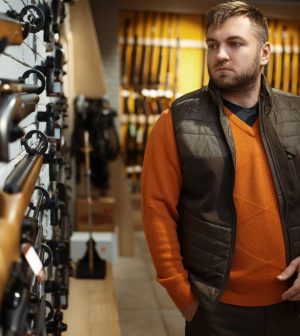- Could Your Grocery Store Meat Be Causing Recurring UTIs?
- Are You Making This Expensive Thermostat Error This Winter?
- Recognizing the Signs of Hypothyroidism
- 10 Strategies to Overcome Insomnia
- Could Artificial Sweeteners Be Aging the Brain Faster?
- Techniques for Soothing Your Nervous System
- Does the Water in Your House Smell Funny? Here’s Why
- Can a Daily Dose of Apple Cider Vinegar Actually Aid Weight Loss?
- 6 Health Beverages That Can Actually Spike Your Blood Sugar
- Treatment Options for Social Anxiety Disorder
Background Checks Not Enough to Lower Gun Homicide Rates: Study

Background checks alone might not be enough to reduce shooting deaths in the United States, a new study warns.
States that require gun permits, rather than relying solely on universal background checks, have firearm murder rates that are 18% lower, on average, researchers reported Aug. 1 in the journal JAMA Network Open.
“These findings cast doubt on the main strategy currently being used by gun violence prevention advocates and policymakers to reduce firearm fatalities,” said researcher Michael Siegel, a professor of public health and community medicine at the Tufts University School of Medicine in Boston.
“If state lawmakers really want to reduce gun violence, the most effective policy they can enact is one that requires permits in order to purchase or possess a gun,” Siegel added in a Tufts news release.
For the study, researchers compared firearm murders in 12 states with universal background checks but no permit requirements against those in seven states that have gun permit laws on the books. The data ran from 1976 to 2022.
States that require gun permits saw reductions in shooting deaths ranging from 2% to 32%, but background checks alone made little difference, researchers said.
While requirements vary by state, permit laws typically require people to go through a series of checks before granting authorization to buy guns from various dealers. The permit typically is valid for several years.
State-level criminal databases maintained for gun permit laws are more consistently kept up to date, Siegel said, and are more likely to record lower-level crimes like domestic battery or driving under the influence.
In addition, people with criminal records can buy a firearm when a background check takes so long that it passes 72-hour window in which a person can legally be kept waiting for a gun.
Permits also can be immediately suspended upon conviction of a crime that disqualifies gun ownership, while background checks might take some time to catch up to the conviction, Siegel said.
“Some gun owners might hear this and say that permits are much more intrusive, but I want to emphasize it’s actually a win-win, both for gun owners and public health,” Siegel said.
Siegel argues that gun owners on average have four or more firearms, so having a permit system makes it easier for them to make multiple purchases over time. They don’t have to wait for a background check for each purchase.
This sort of research could lead to better laws for both gun owners and the general public, Siegel said.
“One of the major implications of this research is that it supports changing the way we do things, such as encouraging all states to adopt reciprocal permitting systems, meaning a person with a gun permit in one state would be allowed to bring their license and gun legally into another state,” Siegel said.
More information
The U.S. Centers for Disease Control and Prevention has more on firearm injuries and deaths.
SOURCE: Tufts University, news release, Aug. 1, 2024
Source: HealthDay
Copyright © 2026 HealthDay. All rights reserved.










